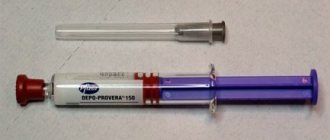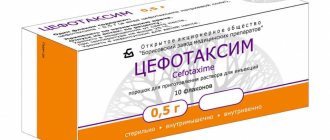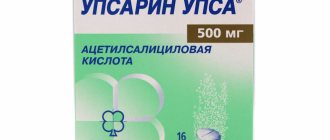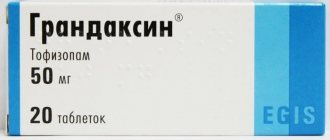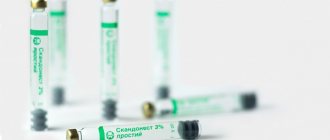Moditen® depo (Moditen® depo)
Due to possible cross-sensitivity, caution should be exercised in prescribing Moditen® Depot to patients with a history of allergic reactions to phenothiazine derivatives.
If cholestatic jaundice develops as an adverse reaction, treatment with Moditen® Depot should be discontinued.
During surgical operations, patients taking high doses of phenothiazine derivatives may experience a sharp decrease in blood pressure.
It may be necessary to reduce the doses of anesthetics or antipsychotics in some patients when treated with Moditen® Depot; it is possible to potentiate the effect of m-anticholinergics, since fluphenazine has an m-anticholinergic effect.
Moditen® Depot should be prescribed with caution in very hot weather or poisoning with phosphorus insecticides, in patients with a history of seizures (since cases of grand mal seizures have been described during treatment with fluphenazine), as well as in patients with mitral valve insufficiency or other cardiac disorders. vascular system or with pheochromocytoma.
The drug should be prescribed with caution for breast cancer, because as a result of the secretion of prolactin induced by phenothiazine derivatives, the risk of disease progression and resistance to treatment with endocrine and cytostatic drugs increases.
Cases of development of venous thromboembolism have been observed when taking antipsychotic drugs. Because patients taking antipsychotic drugs often have risk factors for the development of venous thromboembolism, it is necessary to evaluate these factors before and during treatment and take appropriate preventive measures.
When prescribed to patients with Parkinson's disease, extrapyramidal effects may be enhanced.
Extrapyramidal symptoms that occur as adverse reactions are usually reversible, but can also be persistent. The likelihood and severity of such undesirable side reactions depends to a greater extent on individual sensitivity than on other factors, but the dose and age of the patient are important. The patient should be warned in advance about such manifestations and their reversibility. Usually, to eliminate these undesirable effects, it is sufficient to prescribe m-anticholinergic drugs or antiparkinsonian drugs and/or reduce the dose of the drug.
Tardive dyskinesia
The severity of this syndrome and the deterioration of the condition caused by it can vary significantly among different patients. Tardive dyskinesia occurs either during treatment, when the dose is reduced, or after cessation of therapy. Early detection of tardive dyskinesia is very important. To detect this syndrome, in the initial stage it is recommended to periodically reduce the dose of the antipsychotic (if possible due to the patient’s condition) and monitor the patient during this period. This approach is extremely important; since treatment with antipsychotics may hide the manifestations of tardive dyskinesia.
Neuroleptic malignant syndrome
If this adverse reaction develops, you should immediately stop taking antipsychotics and other medications that do not affect the maintenance of vital functions, and intensive symptomatic treatment, constant monitoring of vital functions, and therapy for concomitant diseases are also necessary.
Cerebrovascular disorders
An approximately 3-fold increase in the risk of developing cerebrovascular accidents was observed when taking some atypical antipsychotics in patients with a history of dementia. There has been an increase in mortality in elderly patients with a history of dementia during treatment with antipsychotic drugs. The extent of the risk and the reasons for this phenomenon are unknown.
The cause of this phenomenon is unknown, but an increased risk of developing cerebrovascular accidents in other patient populations or when taking other antipsychotics cannot be excluded. In this regard, caution must be exercised when taking Moditen® Depot in patients at risk of developing cerebrovascular accidents.
Hypotension during treatment with fluphenazine is rare. At the same time, in patients with pheochromocytoma, cerebrovascular, renal and severe heart failure (for example, in patients with mitral valve insufficiency), hypotension develops more often while taking Moditen® Depot; These patients require careful monitoring. If severe hypotension develops, rapid intravenous administration of vasoconstrictor drugs is necessary. Injectable norepinephrine is best suited for this purpose. Epinephrine SHOULD NOT be used because phenothiazine derivatives distort the response to epinephrine, resulting in an even greater decrease in blood pressure.
With the development of diseases of the mucous membrane of the mouth, gums or throat or. combination of upper respiratory tract infections. with a change in the number of leukocytes confirming inhibition of hematopoiesis, therapy with Moditen® Depot should be canceled and the necessary therapeutic measures should be started immediately.
Patients with a history of seizures should be prescribed phenothiazine derivatives, including Moditen® Depot, with caution.
It should be borne in mind that the antiemetic effect of phenothiazine derivatives (including the drug Moditen® Depot) may mask vomiting associated with an overdose of other drugs.
Abrupt withdrawal of the drug: mainly taking phenothiazine derivatives. does not cause mental dependence, however, cases of gastritis, nausea and vomiting, and dizziness have been reported with abrupt withdrawal of high doses of phenothiazine derivatives. These symptoms decreased when antiparkinsonian drugs were taken for several weeks after discontinuation.
The drug contains sesame oil, which in rare cases can cause severe allergic reactions.
The gasoline alcohol contained in the drug can cause severe toxic and anaphylactoid reactions in children over 12 years of age.
Drinking alcohol while taking medications is prohibited.
The drug should not be stored in the refrigerator, as this will lead to precipitation of the triglycerides contained in sesame oil. If a sediment appears, the drug should be heated to 37 ° C, and the sediment will dissolve without loss of activity of the active substance.
Buy Moditen depot solution intramuscularly 25 mg/ml 1 ml No. 5 in pharmacies
Instructions for use Moditen depot solution IM injected. oil 25mg/ml 1ml No.5
Dosage forms: solution for injection, oily 25 mg/ml 1 ml Synonyms There are no synonyms. Group Neuroleptics - phenothiazine derivatives International nonproprietary name Fluphenazine Composition Active substance: Fluphenazine. Manufacturers: Bristol-Myers Squibb (Italy), Bristol-Myers Squibb S.r.L. (Italy), Krka d.d. (Slovenia), Krka dd., Novo Mesto (Slovenia) Pharmacological action Has neuroleptic, antipsychotic, antiemetic effects. It has a pronounced blocking effect on dopamine D2 receptors of the central nervous system, combined with moderate inhibition of adrenergic structures. Reduces the activating effect on the cerebral cortex of the reticular formation. A strong and long-lasting antipsychotic effect develops against the background of an activating (energizing) effect. Sedation is moderate and occurs at higher doses. Relieves agitation and aggressiveness caused by productive symptoms. It is characterized by greater potency (25 times stronger in neuroleptic activity than chlorpromazine) and less pronounced extrapyramidal and somatic disorders. In low doses it stimulates motor skills. It is especially effective for malignant nuclear (hebephrenic, catatonic, early paranoid forms) and long-term schizophrenia. When taken orally, it is quickly and completely absorbed. Passes through histohematic barriers, including the BBB and placental. Excreted in urine and partially in bile. Side effects: Drowsiness, lethargy, disorientation, depression, impaired intellectual function, coordination of movements, decreased blood pressure, impaired conduction and heart rhythm, ECG changes, rhinitis, stomatitis, nausea, vomiting, constipation, cholestatic jaundice, skin hyperpigmentation, dermatitis, weight gain body, galactorrhea, amenorrhea, gynecomastia in men, agranulocytosis, photosensitivity, allergic skin reactions; for fluphenazine decanoate (in addition) - extrapyramidal disorders, tardive dyskinesia, facial hyperkinesis. Indications for use Schizophrenia (all forms), acute and chronic psychoses (including paranoid), occurring with symptoms of fear and psychomotor agitation, psychoses of the schizophrenic type, especially with a picture of apathy and indifference, senile psychoses, vomiting caused by antitumor chemotherapy, Huntington's chorea, Gilles de la Tourette's syndrome, hypersexual disorders. Contraindications Hypersensitivity (including to other phenothiazines), organic diseases and brain injuries (especially the hypothalamus), acute depressive states, epilepsy, pheochromocytoma, renal, liver and heart failure, coma, prostatic hypertrophy, blood diseases, leukopenia , pregnancy, breastfeeding, children up to 12 years old. Method of administration and dosage Intramuscularly - 12.5-25 mg every 2-4 weeks. It is possible to increase the dose to 50-100 mg. Overdose No information available. Interaction Enhances the effect of sleeping pills, alcohol and other depressants. Special instructions Use with caution for liver diseases, arrhythmia, mitral valve insufficiency, thyrotoxicosis, Parkinson's disease, closed-angle glaucoma, in combination with hypertensive drugs in elderly patients, as well as those working in conditions of elevated temperature, having contact with phosphorus-containing insecticides. Long-term therapy requires monitoring the number of leukocytes and performing liver function tests. During treatment, you should not engage in activities that require increased attention, rapid mental and motor reactions. Storage conditions List B. In a place protected from light, at room temperature.
READ ALSO
Break not the prisoners, but the system. Testimony of victims, which they gave, looking into the eyes of their tormentors. Report by Elena Masyuk
So, new evidence.
"I'll make a fool of you"
Alexey Shcherbonos, prisoner: “I fell ill with tuberculosis in the 3rd colony in Omsk. This was in April 2021. I arrived on OB-11 to the hospital. They took me to the room where the search was taking place; there were eight employees there. The video camera was turned off, its power supply was hanging on the wall, the music was turned up loud...
Alexey Shcherbonos. Photo from the archive
As soon as I entered this room, they immediately knocked me down, handcuffed me behind my back, put on a hat with earflaps, tied it under my throat so that I wouldn’t break my head on the floor, and started beating me with boxing gloves. Then they put him on his stomach. I don't know what they want, but they take prisoners' pants down to their knees all the time. And they took me off and started: “Have you come to break our foundations? We’re going to rape you now.”
They removed the enema from the wall, where the means that can be used during a search are hung. Then they said: “Okay, let’s not rape you, you’re not our type.” While I was lying on the floor, resisting when they took off my pants, my sides were bruised, and when they hit me on the head, there was a large bruise on my ear. Apparently, they had to hide me somewhere with a bruise on my head.
They put pants on me and took me to the madhouse, the mental ward on the second floor. There are chambers where fools lie, and five closed boxes. They brought me to such a box, laid me on the bed, tied my arms and legs to it, and tied it through my chest. In the morning and evening, for three days in a row, they injected me with either aminazine or something else, I don’t know, but I already understood that I could go crazy, because I started to delirium, I didn’t understand whether I was sleeping or not. On the third day, my whole body was burning.
Then they took me out of the box and forced me to sign that I was being treated in a psychiatric ward. I say: “But I came here to be treated for tuberculosis.” And the doctors told me: “We don’t know, the security department sent you here. You will lie here for now."
Then Kreis Sergei Sergeevich, deputy chief of security for OB-11, took me by the breasts with two fingers and said: “One more body movement, if you try to break our foundations, I’ll make a fool out of you. Now you’ve felt it for three days, so I’ll pierce you for 21 days, you won’t remember your last name, do you understand me?”
Sergey Krais. Photo from the archive
I understood that he was not joking. I took this as a real threat that they could simply turn me into a fool.
There is an injection “Madame Depot” (“Moditen Depot”, a solution for intramuscular administration for schizophrenia. - E.M.), it is given for six months, and during these six months you walk around like a vegetable. A person is turned, he cannot turn himself, he does not control his arms and legs. And they keep them in a madhouse all this time. It’s very difficult to recover from this “Madame Depot” event.
There were two boys with me on OB-11 (one of them had the surname Chernykh), they were certified (exemption from serving their sentence due to illness. - E.M.), they were in the tuberculosis department, and they were supposed to be released in ten days, but for some reason they pushed them into a mental hospital, and they died there.
They were never released, they died the day before their release, and in these closed boxes where prisoners are tied up. I was in the first box, a man hanged himself there before me, he was just a little away from freedom.”
It must be said that the prisoner Alexey Shcherbonos, who spoke about the use of chlorpromazine against him and the threat of the Moditen Depot injection, was actively hidden from the meeting with members of the HRC in June of this year.
Tamara Shcherbonos, wife of Alexey Shcherbonos: “Omsk human rights activists told me that a commission came from Moscow, then I come to meet my husband to find out what and how: “Was there a commission? You wrote complaints to the Investigative Committee and the prosecutor’s office.” He tells me: “Can you imagine, all the days that they lasted, I was taken away to trials for three days in a row. They took me to the Leninsky court. At first I couldn’t understand anything: they would take me to court, but I didn’t have any court these days. They: “Oh, I guess we made a mistake.” And so on for three days.
Then for three days they put him in a cut-off cell (glass) right there, down in the pre-trial detention center. “In the morning,” he says, “they take me out there and keep me there all day until the evening. They were murmuring for six days, starting on the fourth of June.
Then, during the assembly, my husband found out that besides him, several other boys were also hidden from the commission on the same dates. They were also taken to the courts, but there were no hearings.
My husband told me that now he should be taken back to IK-3. He is afraid that he will be severely beaten there for the complaints he wrote against the colony administration.”
"They turned me into litter"
Alexey Shchepetov, former prisoner: “In 2014, I went to Donbass with humanitarian aid and from there posted an appeal to Putin via YouTube. He talked about corruption in his native Vladimir region, about fraud with shareholders, with apartments, and during landscaping.
Alexey Shchepetov. Youtube.com
And when I returned home from Donbass to the city of Yuryev-Polsky (Vladimir region), I was accused of growing hemp on my plot in the village. And there was a man living with me who took care of my dogs when I left for Donbass, an Uzbek. So he grew it, but they blamed me.
They opened a criminal case, they had no evidence, but they arrested me and threw me around the press huts in a pre-trial detention center, intimidated me, they thought I would speak as I should. But they didn't succeed.
Then they throw me into the corner press hut. And every day I felt worse and worse. My head was very dizzy. I myself am an athlete, I have been involved in triathlons all my life, running, jumping, swimming five kilometers. And here I feel bad. Then I realized that as soon as I had eaten, I drank the tea that they brought, and my head was spinning.
Once I come back after a walk, I feel like I’m dying. I started knocking on the door: “Doctor, what’s happening to me?” And they opened the window and smiled...
They took me to a psychologist in the morning, he said: “You need to be taken to a hospital, you’re behaving somehow strangely.” I say: “I’m behaving normally, it seems to me that they are putting something in my food.” They gave me water. They probably added something to the water. The next morning I felt dizzy, I started knocking on the door, they took me out into the passage, and I imagined that I was dying, in my head I don’t understand what started. They tell me: “Sign here, sign here.” I didn’t understand where, what, I said: “I won’t sign.” Well, they hit my legs and arms with batons, took my hand, signed a sheet of paper, collected my things in an hour, called me and took me to the “troika” (IK-3, on the territory of which there is a tuberculosis hospital for prisoners. - E.M.).
In IK-3 they pulled the bag over my head and pulled it out... I said: “Where am I?” They: “In Moscow, in Lefortovo.” That is, I didn’t even understand where I was, what I was, where they had taken me. They brought me in and said: “Well, dear, now we’ll make a good boy out of you.” And that’s it, off we go... The three of them started beating me, then they brought in the prisoners, and the five of them beat me and handcuffed me. After that, they knocked me out, I lost consciousness, and woke up in the shower, tied to a chair. And they gave me some injections there. I felt dizzy, everything was floating. They shaved my head, continued to beat me, stripped me naked and said: “Now we will have you here...” By this time the bruise spread all over my face. I feel like I was suspended by my hands from the soul. I'm hanging and they choke me and shock me. I lost consciousness again. Then I woke up in the hospital.
When they took me to the hospital in IK-3, they gave me two injections, and again I signed for something. It turned out that I agree to treatment, although I don’t remember anything about it. In the hospital they continued to inject me with some kind of incomprehensible crap, after which I slept from morning to evening, and did not even eat. (From the medical record of Alexey Shchepetov: “From pre-trial detention center-1 (Vladimir) Shchepetov was admitted with a diagnosis of “hallucinatory-paranoid syndrome.” He was in the psychiatric department of the Tuberculosis Hospital No. 1FKUZ MSCh-33 of the Federal Penitentiary Service of the Russian Federation from September 21, 2015 to October 9, 2015 . with a diagnosis of “Acute transient psychotic disorder without symptoms of schizophrenia.” Treatment was carried out with aminazine and zalasta (drugs for the treatment of schizophrenia and other psychotic disorders - E.M.)
There they continued to torture me so that I would sign something. They put me on stretchers, connected me to the current - to my little fingers, to my ears, and the current was turned on. After three minutes you really can’t stand anything...
I simply signed blank A4 sheets of paper, marked “written correctly” and signed. That is, I did what was required of me.
I don’t know what they injected me with, but after the injections I immediately fell asleep. It was no longer possible to simply extend my arrest; justification was needed. Then they decided to send me to Moscow, to the Serbsky Institute. That is, like a drug addict, which is what they were trying to do, but there’s nothing in my blood, which means I’m crazy. At Serbsky I went through the entire commission and they recognized me as normal. (“The diagnosed acute mental state does not contain clinical argumentation and scientific validity. Shchepetov does not need to use any compulsory measures of a medical nature,” says the conclusion of the forensic psychiatric commission of experts of the Federal Medical Research Center for Psychiatry and Narcology named after Serbsky. - E M.)
As soon as I arrived from Moscow back to IK-3 in Vladimir, three days later I was immediately thrown into the Vladimir pre-trial detention center. And again they started putting something in my food. I feel dizzy again, and they take me out again. That is, in Moscow they said he’s normal, but he’s actually a fool. And that’s it, then I didn’t remember anything, they kept me somewhere in the basements. I don't remember how the trial went.
Imagine, you are a vegetable, time stops, it flows, but you don’t keep track of time. I vaguely remember how they mocked me, how they laughed...
My weight was always 90–95 kilograms, and then I lost weight to 56. I didn’t eat because I was afraid that I would be poisoned again.
I was in prison for a year and a half. I remember the first six months and the last four months, and the rest is all fragments.
In the last months of my imprisonment, at the request of my lawyer, I was transferred to Ryazan. While I was sitting in Ryazan, the lawyer and my mother took my hair and did an examination. I had excess amounts of aluminum, lithium and lead in my hair. But this did not receive any development. Both the wife and mother are in tears: “Be afraid, you have children, you don’t need anything, now they will start to bite you again.”
When I came out, they told me that I had to leave the Vladimir region. I left after 2-3 months, and during these months I did not go anywhere, I was recovering. I came out - I was angry. They turned me from a normal person into a litter. I had a lot of anger. But nothing can be done. When I was there for the last 4 months, when I was already in my right mind, I was already analyzing everything, I realized that it was useless to fight this system, this machine: everyone washes each other’s hands, and it’s simply pointless.”
"I'm being gassed"
From the complaint of prisoner Vladimir Khalilov (IK-7, Omsk) to the Investigative Committee and the Omsk prosecutor’s office: “They gas me, bringing the hose to the door of the cell in which I am kept, they also bring the hose to the observation window in the cell door. The doors of the cell in which I am kept are not visible to the CCTV camera. When my window is open, a convict who works in the premises of the EPKT, a punishment cell (six convicts work for administration employees) comes up to my window from the street and brings a hose to my window and begins to gas me. They mix something into my food and water. I'm afraid to eat and drink."
Vladimir Khalilov. Photo from the archive
Comment from lawyer Vera Goncharova: “Some prisoners in Omsk colonies and the Krasnoyarsk Territory complained of periodically appearing unpleasant odors in the cell, after which they feel dizzy, their heart rate increases, they feel a burning sensation and dry mouth. Some claim that gas is released into the chamber and the windows are blocked. The same is said about water. In particular, prisoners in Omsk suggest that some kind of “poison” is added to the water and food. Some people refuse to eat because of this.
“When I finished eating boiled cabbage, I no longer understood anything and could not control myself. Two people, an orderly and a food distributor, took me to a cell and put me to bed. Then I vaguely remember the lawyer,” this is how one of the convicts described his condition. Clean water from the tap, which a prisoner in Omsk collected for his needs, according to him, was covered with a film, and at another time “soaped”, as if detergent had been added to it. It can be assumed that in Omsk the quality of water suffers due to the proximity to the oil refinery colony, but how then can we explain the specific odors and their consequences for the body that the prisoners talk about?”
Photo: RIA Novosti
From the complaint of prisoner Vladimir Khalilov to the Investigative Committee and the Omsk prosecutor’s office: “Employees of the administration of IK-7 threatened to kill me because I was a witness in a criminal case that the Investigative Committee opened against employees of the administration of IK-7 for violence and torture. Although in this criminal case I am a victim, since I arrived at FKU IK-7 on 12/10/15 and violence and torture were used against me that day.
Login to the site
According to the International Society for Human Rights, at least two million people became victims of punitive psychiatry in the USSR. “Sluggish schizophrenia” was the favorite diagnosis of Soviet psychiatrists not only for political dissidents, but also for vagabonds, army draft dodgers and religious dissidents. Haloperidol helped fight “socially dangerous” citizens of the Soviet Union. In modern Russia, neuroleptics are again in the service of the state. Only now, instead of “sluggish schizophrenia,” Russian psychiatrists diagnose “emotional personality disorder.” The FSIN system, closed from society, has become an excellent testing ground for a new punitive psychiatric revolution in the history of the country.
During a joint trip from the HRC with human rights activist Andrei Babushkin to the institutions of the Federal Penitentiary Service in the Omsk region in June of this year, we repeatedly heard from prisoners complaints that they were not only tortured with electric shock, water, beaten, raped, suspended, but also poisoned: with gas, poisoned water and food. They also inject the psychotropic drug Aminazine.
I must say that we were quite skeptical about the information about the persecution of prisoners. However, we found in the psychiatric department of regional hospital No. 11 (OB-11) of the Federal Penitentiary Service of Omsk a prisoner from IK-7, who by that time had been tied to the bed for five days and who, in our opinion, was absolutely healthy and not showed no aggression, forced us to look differently at such complaints from the prisoners.
